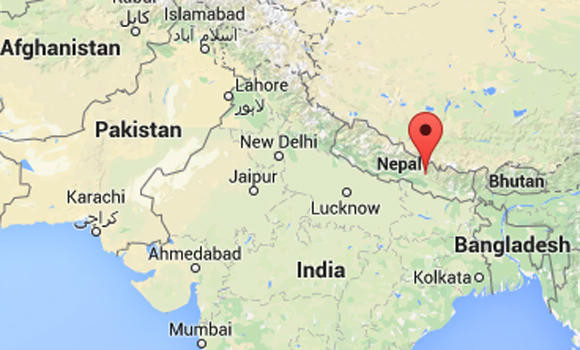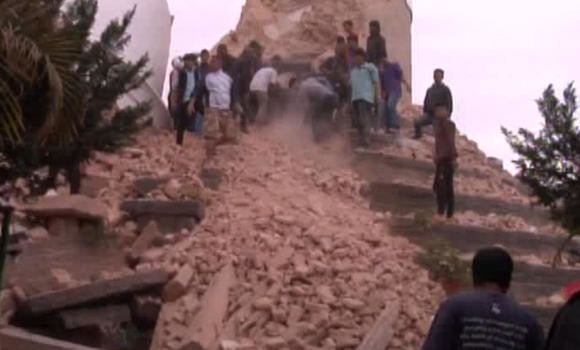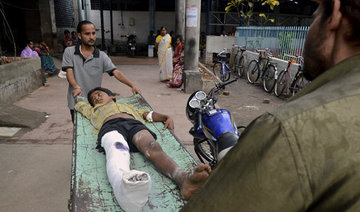KATMANDU: A powerful earthquake struck Nepal Saturday, killing at least 718 people across a swath of four countries as the violently shaking earth collapsed houses, leveled centuries-old temples and triggered avalanches on Mt. Everest. It was the worst tremor to hit the poor South Asian nation in over 80 years.
At least 688 people were confirmed dead in Nepal, according to the police. Another 20 were killed in India, six in Tibet and two in Bangladesh. Two Chinese citizens died at the Nepal-China border. Given the scale of the destruction, the death toll is almost certain to rise, said Home Ministry official Laxmi Dhakal.
It was a few minutes before noon when the quake, with a preliminary magnitude of 7.8, began to rumble across the densely populated Katmandu Valley, rippling through the capital Katmandu and spreading in all directions — north toward the Himalayas and Tibet, south to the Indo-Gangetic plains, east toward the Brahmaputra delta of Bangladesh and west toward the historical city of Lahore in Pakistan.
A magnitude-6.6 aftershock hit about an hour later, and smaller aftershocks continued to jolt the region for hours. Residents ran out of homes and buildings in panic. Walls tumbled, large cracks opened up on streets and walls. Towers collapsed and clouds of dust began to swirl all around.
Within hours, hospitals began to fill up with dozens of injured people. Many came to the main hospital in central Katmandu. Among them was Pushpa Das, a laborer, ran from the house when the first quake struck but could not escape a collapsing wall that injured his arm.
“It was very scary. The earth was moving ... I am waiting for treatment but the (hospital) staff is overwhelmed,” he said, gingerly holding his right arm with his left hand. As he spoke dozens of more people showed up with injuries, mostly from falling bricks.
Following the quake, Katmandu’s international airport was shut down.
While the extent of the damage and the scale of the disaster are yet to be ascertained, the quake will likely put a huge strain on the resources of this poor country best known for Everest, the highest mountain in the world, and its rich Hindu culture. The economy of Nepal, a nation of 27.8 million people, is heavily dependent on tourism, principally trekking and Himalayan mountain climbing.
A senior mountaineering guide, Ang Tshering, said an avalanche swept the face of Mt. Everest after the earthquake, and government officials said at least 30 people were injured.
Tshering of the Nepal Mountaineering Association said the avalanche occurred between the Khumbu Icefall, a rugged area of collapsed ice and snow, and the base camp where most climbing expeditions have their main camps.
Carsten Lillelund Pedersen, a Dane who is climbing the Everest with a Belgian climber Jelle Veyt, said on his Facebook page that they were at Khumbu Icefall , a rugged area of collapsed ice and snow close to base camp at altitude 5,000 meters (16,500 feet) when the earthquake hit.
He wrote on his Facebook that they have started to receive the injured, including one person with the most severe injuries who sustained many fractures.
“He was blown away by the avalanche and broke both legs. For the camps closer to where the avalanche hit, our Sherpas believe that a lot of people may have been buried in their tents,” he wrote in English.
“There is now a steady flow of people fleeing basecamp in hope of more security further down the mountain“
The quake’s epicenter was 80 kilometers (50 miles) northwest of Katmandu, and it had a depth of only 11 kilometers (7 miles), which is considered shallow in geological terms. The shallower the quake the more destructive power it carries, and witnesses said the trembling and swaying of the earth went on for several minutes..
Several buildings collapsed in the center of the capital, the ancient Old Katmandu, including centuries-old temples and towers, said resident Prachanda Sual.
Among them was the nine-story Dharahara Tower, one of Katmandu’s landmarks built by Nepal’s royal rulers as a watchtower in the 1800s and a UNESCO-recognized historical monument. It was reduced to rubble and there were reports of people trapped underneath.
Hundreds of people buy tickets on weekends to go up to the viewing platform on the eighth story.
Video footage showed people digging through the rubble of the bricks form the collapsed tower, looking for survivors.
The Katmandu Valley is densely populated with nearly 2.5 million people, and the quality of buildings is often poor.
In Katmandu, dozens of people were gathered in the parking lot of Norvic International Hospital, where thin mattresses were spread on the ground for patients rushed outside, some wearing hospital pajamas. A woman with a bandage on her head sat in a set of chairs pulled from the hospital waiting room.
Doctors and nurses hooked up some patients to IV drops in the parking lot, or were giving people oxygen.
The US Geological Survey revised the magnitude from 7.5 to 7.9 but then lowered it to 7.8. It said the quake hit at 11:56 a.m. local time (0611 GMT) at Lamjung. It was the largest shallow quake since the 8.2 temblor off the coast of Chile on April 1, 2014.
The quake — with the same magnitude as the one that hit San Francisco in 1906 — was about 16 times more powerful than the 7.0 quake that devastated Haiti in 2010.
A magnitude 7 quake is capable of widespread and heavy damage while an 8 magnitude quake can cause tremendous damage.
A Swedish woman, Jenny Adhikari, who lives in Nepal, told the Swedish newspaper Aftonbladet that she was riding a bus in the town of Melamchi when the earth began to move.
“A huge stone crashed only about 20 meters (yards) from the bus,” she was quoted as saying. “All the houses around me have tumbled down. I think there are lot of people who have died,” she told the newspaper by telephone. Melamchi is about 45 kilometers (30 miles) northeast of Katmandu.
Residents reported seeing trails of destruction -collapsed walls, broken windows and fallen telephone poles — as they drove through the capital, along with streets filled with terrified people.
But scattered reports also indicated that most buildings in the capital did not collapse.
“It’s too early to make any assessment but the damage isn’t as bad as it could have been,” said Liz Satow, the Nepal director for the aid group World Vision. She said she drove from Katmandu to the nearby town of Lalitpur and said that while there was considerable damage, most buildings were still intact.
Nepal suffered its worst recorded earthquake in 1934, which measured 8.0 and all but destroyed the cities of Katmandu, Bhaktapur and Patan.
The sustained quake also was felt in India’s capital of New Delhi and several other Indian cities.
India’s Prime Minister Narendra Modi called a meeting of top government officials to review the damage and disaster preparedness in parts of India that felt strong tremors. The Indian states of Uttar Pradesh, Bihar and Sikkim, which share a border with Nepal, have reported building damage. There have also been reports of damage in the northeastern state of Assam.
Pakistan Prime Minister Nawaz Sharif offered “all possible help” that Nepal may need.
___
Naqvi reported from New Delhi. Associated Press writer Munir Ahmed in Islamabad, Jan M. Olsen in Copenhagen and Seth Borenstein in Washington DC contributed to this report.
Nepal quake: Hundreds dead, history crumbled, Everest shaken
Nepal quake: Hundreds dead, history crumbled, Everest shaken

Malaysia ex-PM Mahathir, 100, discharged from hospital

- Mahathir Mohamad was leader of the Southeast Asian nation for more than two decades
- He has been hospitalized repeatedly in recent years, most recently in October for a respiratory infection
Mahathir, leader of the Southeast Asian nation for more than two decades, has a history of heart problems and has undergone bypass surgeries. He has been hospitalized repeatedly in recent years, most recently in October for a respiratory infection.
He was under observation at the National Heart Institute in Kuala Lumpur for fatigue-related issues on Sunday, his office said. “Mahathir has been allowed home as of 4:45 p.m. (0845 GMT),” it said in a statement.
A physician who was a member of parliament until 2022, Mahathir drove himself on Sunday to the celebration, which also marked the 99th birthday of his wife, Hasmah Mohd Ali, a day earlier, local media reported.
The reports said he cycled for an hour before appearing tired. His birthday was on Thursday.
Mahathir was prime minister for 22 years until 2003. He returned as premier in 2018 after leading the opposition coalition to a historic win, but his government collapsed in less than two years due to infighting.
Several hurt in anti-migrant unrest in Spanish town

- The regional government did not say how many people were injured but stated that at least one person had been arrested for the violence.
MADRID: Several people were hurt in a second night of anti-migrant unrest in the Spanish town of Torre Pacheco after a pensioner was beaten up, authorities said on Sunday.
Despite a major police presence, groups armed with batons roamed the streets looking for foreign-origin people, regional newspaper La Opinion de Murcia reported.
The regional government did not say how many people were injured but stated that at least one person had been arrested for the violence.
The unrest erupted after a 68-year-old man told Spanish media he was beaten up in the street on Wednesday by three youths of North African origin.
The attack was filmed and put on social media.
The town hall organized a demonstration on Friday that was intended to be peaceful but where far-right elements shouted anti-migrant slogans.
One group, named “Deport Them Now,” posted a message on social media calling for attacks against people of North African origin.
Spanish authorities launched an appeal for calm on Sunday in the town of 36,000 people.
“Torre Pacheco must get back to normal,” said the head of the Murcian regional government Fernando Lopez Miras in a message on X.
“I understand the frustration but nothing justifies violence,” added the conservative politician.
“I call on residents to be calm, for tranquility,” said Torre Pacheco mayor, Pedro Angel Roca Ternel, on RTVE public television.
Spain’s Youth Minister Sira Rego, a member of the extreme left wing party Sumar, condemned the violence against migrants in a message on Bluesky, blaming the role of the “ultra-right” in the unrest.
Russia takes new village in Ukraine’s Donetsk region

- Russian troops advance toward the neighboring Dnipropetrovsk region
- Russia’s defense ministry say troops had captured the village of Myrne
MOSCOW: Russia said on Sunday it took another village in the west of Ukraine’s Donetsk region, as its troops advance toward the neighboring Dnipropetrovsk region.
Moscow’s offensive on Ukraine has lasted for more than three years, with attacks intensifying this summer and US-led negotiations so far yielding no results to end the fighting.
Russia’s defense ministry said Russian troops had captured the village of Myrne, calling the village by its Soviet name “Karl Marx.”
It lies close to the administrative border between the Donetsk and Dnipropetrovsk regions.
The ministry claimed forces had moved “deep into the enemy’s defense” to take the village.
Myrne was one of two villages Moscow claimed on Sunday.
Russia has for months refused a ceasefire proposed by the United States and Kyiv.
Moscow launched its full-scale offensive against Ukraine in February 2022.
France says Australia defense ties repaired after submarine row

- Paris expressed its “strong regrets” when Australia tore up a multibillion-dollar deal to buy a fleet of diesel-powered submarines from France
SYDNEY: France’s defense relations with Australia have recovered after their 2021 bust-up over a major submarine contract, the country’s ambassador said Sunday.
Paris expressed its “strong regrets” when Australia tore up a multibillion-dollar deal to buy a fleet of diesel-powered submarines from France, Ambassador Pierre-Andre Imbert said.
Since the 2022 election of Prime Minister Anthony Albanese, however, the defense relationship had been “restarted,” he said.
“Now, the first pillar of our cooperation is defense and security, so we have a very good level of cooperation,” the ambassador told AFP as French forces joined major military drills around Australia.
When Australia ditched the French deal, it opted instead to acquire nuclear-powered vessels in a new three-way AUKUS pact with the United States and Britain.
But a US defense official last month revealed that a review of AUKUS was underway to ensure it “aligned with the President’s America First agenda” and that the US defense industrial base was “meeting our needs.”
Under the AUKUS deal, Australia would acquire at least three Virginia class submarines from the United States within 15 years, eventually manufacturing its own subs.
The US Navy has 24 Virginia-class vessels but American shipyards are struggling to meet production targets set at two new boats each year.
Asked if France would ever consider discussing a new submarine deal with Australia if the AUKUS agreement was torpedoed by the review, the French ambassador said he was reluctant to speculate.
“I would say it’s more an issue for Australia for the moment. And of course, we are always discussing with our friends of Australia,” he said.
“But for the moment, they have chosen AUKUS,” he said. “If this changes (and) they ask, we’ll see.”
More than 30,000 military personnel from 19 nations are set to join the three-week, annual Talisman Sabre military exercises, which started Sunday across Australia and Papua New Guinea.
Australia PM Albanese kicks off China visit focused on trade

- Anthony Albanese is set to meet business, tourism and sport representatives in Shanghai and Chengdu
- Albanese wants to reduce Australia’s economic dependence on China, a free trade partner
BEIJING: Australian Prime Minister Anthony Albanese kicked off a visit to China this weekend meant to shore up trade relations between the two countries.
Albanese met with Shanghai Party Secretary Chen Jining on Sunday, the first in a series of high-level exchanges that will include meetings with Chinese President Xi Jinping, Premier Li Qiang and Chairman Zhao Leji of the National People’s Congress.
Albanese is leading “a very large business delegation” to China, which speaks to the importance of the economic relations between Australia and China, he told Chinese state broadcaster CGTN upon his arrival in Shanghai Saturday.
During a weeklong trip, Albanese is set to meet business, tourism and sport representatives in Shanghai and Chengdu including a CEO roundtable Tuesday in Beijing, his office said.
It is Albanese’s second visit to China since his center-left Labour Party government was first elected in 2022. The party was reelected in May with an increased majority.
Albanese has managed to persuade Beijing to remove a series of official and unofficial trade barriers introduced under the previous conservative government that cost Australian exporters more than 20 billion Australian dollars ($13 billion) a year.
Beijing severed communications with the previous administration over issues including Australia’s calls for an independent inquiry into the origins of and responses to COVID-19. But Albanese wants to reduce Australia’s economic dependence on China, a free trade partner.
“My government has worked very hard to diversify trade … and to increase our relationships with other countries in the region, including India and Indonesia and the ASEAN countries,” Albanese said before his visit, referring to the 10-member Association of Southeast Asian Nations.
“But the relationship with China is an important one, as is our relationships when it comes to exports with the north Asian economies of South Korea and Japan,” he added.
Chinese state-run Xinhua News Agency, in an editorial Sunday, described China’s relationship with Australia as “steadily improving” and undergoing “fresh momentum.”
“There are no fundamental conflicts of interest between China and Australia,” the editorial stated. “By managing differences through mutual respect and focusing on shared interests, the two sides can achieve common prosperity and benefit.”






















